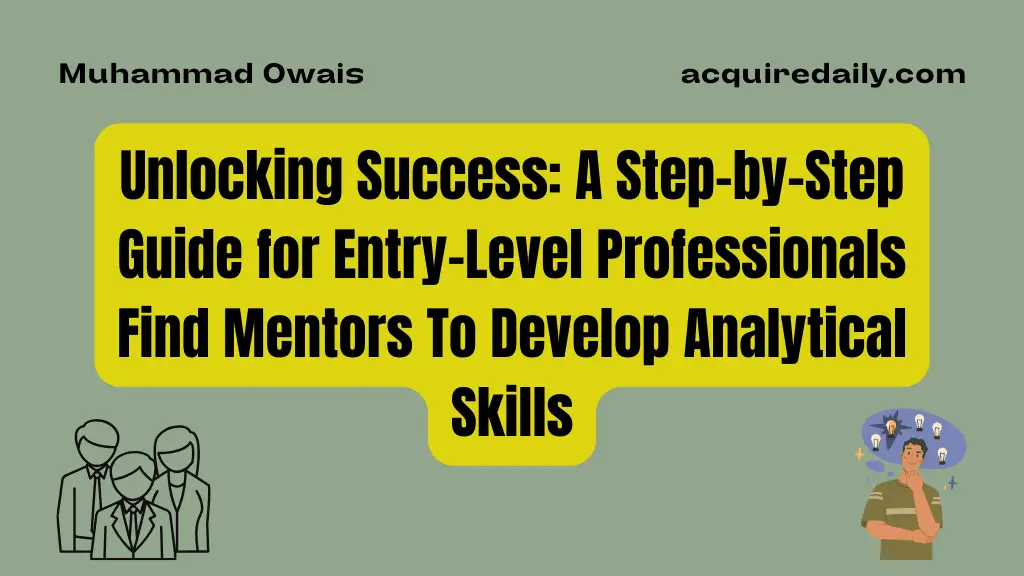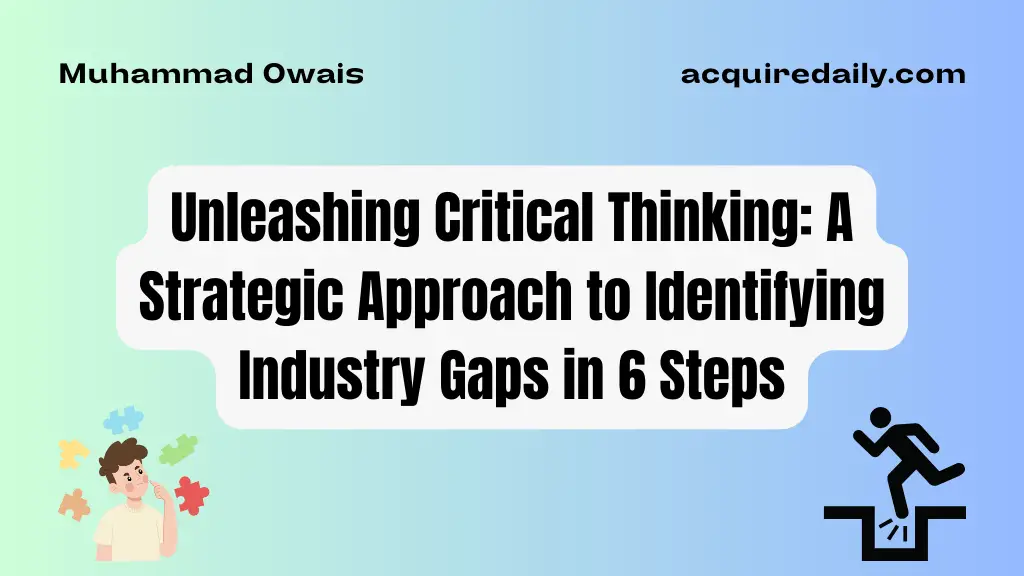Introduction: The Power of Mentorship in Analytical Skill Development
Developing strong analytical skills early in your career is crucial for long-term success. Analytical skills allow you to gather, interpret, and analyze information to solve problems and make well-informed decisions. While classes and training programs can provide a foundation, there is no substitute for learning directly from an experienced mentor. The right mentorship accelerates analytical skill development exponentially compared to trying to go it alone.
But finding the perfect mentor isn’t always straightforward for professionals just starting out. You may not have access to senior leaders in your company or know where to find mentors in your industry. The good news is there are specific, proactive steps entry-level professionals can take to connect with mentors perfectly suited to developing their analytical abilities. Let’s explore them in more detail.
Table of Contents
- Identify Your Goals and Analytical Skill Needs
- Research and Network
- Reach Out and Build Rapport
- Establish Expectations and Boundaries
- Learn and Grow
- Tracking Your Progress: Measuring Analytical Skill Growth
- Taking the Next Steps: Applying Analytical Skills in Your Career
- Testimonials: Real Stories of Entry-Level Success Through Mentorship
- Conclusion: Your Journey to Analytical Excellence Begins Now
- Key Takeaways
- Frequently Asked Questions – FAQs
Identify Your Goals and Analytical Skill Needs
Before reaching out to potential mentors, take time to reflect on your career goals and identify gaps in your analytical skills. Ask yourself:
- What role do you want to be in the long term? What analytical skills are needed to get there?
- What analytical weaknesses do you want to improve? Are you looking to get better at analyzing data, critical thinking, problem-solving, etc.?
- What projects or tasks in your current role are difficult because you lack certain analytical skills?
- What analytic skills come more naturally to you? Which requires more work to develop?
By knowing exactly what analytical abilities you want to gain, you can find mentors who excel in those areas. Avoid vaguely asking to “improve your analytical skills.” Be specific about the skills and knowledge you hope to build.
Research and Network
With your target analytical abilities defined, make a list of professionals who exemplify those skills. These could be leaders in your industry renowned for analytical excellence or experts in your company. Look for mentors who not only have impressive analytical skills themselves but have successfully mentored others.
Expand your search through professional networking. Attend industry events, conferences, and seminars to connect with potential mentors. Reach out to former professors or colleagues who may have helpful contacts. Use social media and alumni networks to find mentors outside your immediate work circles.
Reach Out and Build Rapport
After identifying prospective mentors, reach out to introduce yourself and request an informational interview. Be clear you are seeking their guidance on developing specific analytical skills. Come prepared with thoughtful questions to start building rapport.
Avoid overselling yourself or making exaggerated claims about your abilities. Be honest about your skill gaps and desire to learn. Show genuine interest in their experiences and appreciation for their time. If the conversation goes well, ask if they would be open to an ongoing mentorship.
Establish Expectations and Boundaries
If a prospective mentor agrees, have an open discussion to define the relationship’s purpose, boundaries, and logistics before diving in. Key questions to align on:
- How often will you meet? Every month or quarter?
- What’s the best way to communicate – email, phone, video chat?
- How can the mentor provide feedback on your analytical thinking? Through case studies?
- Are there any strategic or confidential matters they cannot advise you on?
Having structured expectations from the outset ensures a productive mentoring partnership. It also prevents confusion down the road. Don’t make assumptions about the mentor’s time commitments or availability.
Learn and Grow
With a defined mentoring relationship in place, get ready to accelerate your analytical skills development! Come to each mentorship session prepared to maximize the experience.
- Bring specific questions and problems you want their help analyzing. Walk through your logic and thought process. Ask them to pinpoint flaws and suggest better analytical approaches.
- Before important work projects, discuss your analytical strategy with your mentor. Get their input on analysis frameworks, data to gather, variables to consider, etc.
- Ask your mentor to recommend learning resources related to improving analytical abilities – books, online courses, case studies, etc. Review materials between sessions.
- Request your mentor’s constructive criticism of your analytical skills. Identify strengths to build on and weak spots to improve.
Treat every mentoring conversation as a precious opportunity to advance your analytical thinking.
Tracking Your Progress: Measuring Analytical Skill Growth
As your mentorship progresses, regularly check in on your analytical skill growth. Are you analyzing problems more systematically? Making better data-driven decisions? Avoiding mental pitfalls and biases?
Quantifying your progress motivates continued improvement. Some methods to track growth:
- Before/after case study analysis – How has your thinking changed on sample business cases?
- Ask your manager for input – Have they noticed improvements in your analysis and decision-making?
- Take an analytical skills test – Are scores higher now than when you started your mentorship?
- Journal your reflections – Review entries over time to see analytical mindset shifts.
Celebrate each analytical skill gain, no matter how small. Recognize the distance you’ve already come.
Taking the Next Steps: Applying Analytical Skills in Your Career
As your abilities grow, look for opportunities to apply your strengthened analytical skills on the job. Use them to:
- Launch impactful projects requiring rigorous analysis.
- Apply for promotions into roles needing complex analytical thinking.
- Solve problems and make recommendations backed by air-tight analysis.
- Evaluate data and business scenarios more objectively.
- Construct stronger arguments relying more on logic and facts.
Owning key projects and assignments that showcase your advanced analytical talents accelerates your career while reinforcing skills. Analytical excellence becomes a self-perpetuating success.
Testimonials: Real Stories of Entry-Level Success Through Mentorship
Mentorship is the catalyst that unlocks analytical excellence and career success. Here are just a few examples:
Sarah, 27, struggled with data analysis in her marketing coordinator role. Through a mentorship focused on analytics, she can now run PR and ad campaign numbers, identifying the most cost-effective channels. She got a promotion to Senior Marketing Manager within a year.
James, 24, had gaps in critical thinking coming out of college. Now after a 6-month mentorship, he can quickly spot biases and flaws in reasoning at his financial analyst job. He will soon have enough analytical rigor to transition into investment banking.
Nicole, 23, lacked the strategic analysis abilities for a management consulting career. But after her mentor helped her master frameworks like Porter’s Five Forces, she developed the analytical chops to land an Associate role at a top firm.
Conclusion: Your Journey to Analytical Excellence Begins Now
At any career stage, developing your analytical skills accelerates success. But there is no better time than early in your career to establish these talents. Finding the right mentor gives entry-level professionals like yourself the necessary real-world wisdom and training to achieve analytical greatness. Use the step-by-step process outlined above to connect with your perfect analytical skills mentor today. Your future achievements depend on it!
Key Takeaways
- Analytical skills are crucial for long-term career success and enable better problem-solving and decision-making. Developing them early accelerates growth.
- Be specific when identifying analytical skills to target for development, like data analysis or critical thinking. Seek mentors strong in those precise areas.
- Proactively network and reach out to find mentors. Establish structured expectations and boundaries for an effective partnership.
- Maximizing mentor sessions by analyzing real examples and getting constructive feedback is key to growth. Track progress over time.
- Apply strengthened analytical abilities on the job through impactful projects and promotions. Mentorship unlocks success stories across industries.
Frequently Asked Questions – FAQs
Question: What are some common analytical skills I should look to develop as an entry-level professional?
Answer: Critical thinking, problem-solving, data analysis, research skills, strategic analysis, and deductive reasoning are some of the most important analytical skills to build early in your career.
Question: How can I identify professionals who could potentially mentor me in developing analytical talents?
Answer: Great potential mentors are often senior people in your industry, accomplished analytical thinkers in your company, former professors or colleagues, and connections through networking events and alumni groups.
Question: What is the best way to approach a prospective mentor?
Answer: Introduce yourself and explain you are looking for guidance in building specific analytical skills that would help you advance professionally. Request an informational interview to establish rapport.
Question: What is a reasonable time commitment to ask of a mentor?
Answer: Limit it to about an hour a month initially through calls or video chats. The frequency can increase if the mentorship is going well. But be mindful of your mentor’s time and availability.
Question: How can I make the most out of my mentorship sessions?
Answer: Come prepared with specific analytical problems or case studies to discuss. Ask for feedback on your logic and ways to improve. Have your mentor recommend learning resources to review afterward.
Question: How will I know if my analytical skills are actually improving through the mentorship?
Answer: Quantify progress by comparing case study analysis over time, taking analytical skills assessments, getting input from your manager, and journaling to track mental growth.
You May Also Like
How To Work Smarter: 6 Effective Ways To Work Smart Not Hard
How To Sell Your Craft (Without Being Salesy)? Crafting An Honest Personal Pitch.








